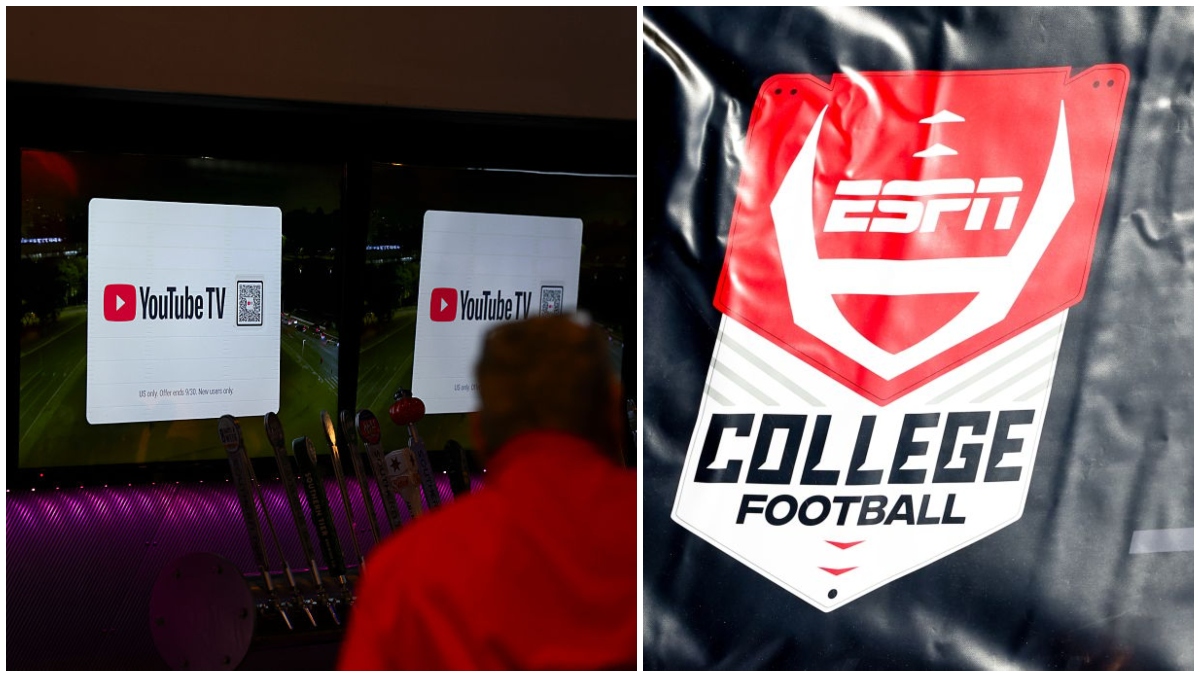Copyright outkick

Last week, in the latest battle between big companies that ends up screwing the fans over, Google owner YouTube and Disney owner ESPN couldn't come to an agreement on carrying the ESPN/ABC family of networks on YouTube TV, so football fans have been the big losers. Specifically, based on the ratings, SEC football fans, who consume the vast majority of the content lost to YouTube TV customers. That's because every SEC football game is carried on ESPN channels or ABC, which means, unlike with most sports disputes, the entire SEC programming slate is lost to YouTube TV subscribers. Things have gotten so bad that my own email inbox has been full of angry emails from SEC fans, and I've got nothing to do with either party here. In fact, so far as I know, it's possible both companies hate me. I've been banned from appearing on ESPN channels for roughly a decade now and YouTube put us on probation multiple times for saying wearing masks was dumb and the covid shot was mostly worthless at preventing covid infection. (I was correct on both, by the way.) Heck, YouTube even refused to let us post our Clay and Buck interview with President Trump and Senator Rand Paul back in the day. Sidenote: The man YouTube banned, President Trump, is now the president of the United States and I've written a bestselling book about his 2024 win and what it means going forward. It's called, "Balls." You should buy it. Also, for those of you who are really lazy, I also read it. The audio book is six hours of my voice. Amazing value here. So, when I say this you can know I'm being completely unbiased here: Both companies suck and the fans are the ones getting screwed here. Streaming Era Relaties And it feels like to me that's always the result of everything in the streaming era. I don't want to sound too much like an old man here, but streaming is worse than basic cable. The peak era for watching sports? Somewhere around 2008, when HD television was standard, DVR's were embedded everywhere, and you could watch every sporting event LIVE with one remote control. Now I need eighteen different access codes to watch all my favorite sporting events. Half the time I can't remember my passwords or email addresses, and even when I do manage to get logged in, there's an inevitable blackout impacting my favorite teams. Honestly, we all pay more in a streaming era and get way less. Plus, the streamed games ARE ON A DELAY, meaning you find out what happened from a buddy or on social media before they actually happen on your screen. The entire point of technology is supposed to be that it makes things better than they were before, but that's not happening for sports fans. We all end up paying way more for less. But in this particular situation, the fans getting screwed the most are the SEC fans. And, honestly, it feels to me like the entire ESPN business model is basically reliant on SEC fans now. Think about it. ESPN's overall game offerings are now one NFL Monday Night Football game a week, one third of the NBA, most of which are regular-season games no one cares about, NHL games that most people don't care about this time of year, and the ACC, which most people don't watch that much during football season, especially when Florida State and Clemson stink. That leaves us with the signature content offering of the fall — the SEC football games. (The college football playoff is mostly on ESPN, but these are relatively few games and don't start until late December.) SEC Football Is ESPN's Biggest Draw The SEC football games absolutely dominate the ratings every Saturday for ESPN, providing all-day anchor programming for the network across multiple channels. Just this past Saturday, there was a tripleheader of SEC games: Vanderbilt at Texas, Georgia vs. Florida, and then Oklahoma at Tennessee. Five of these six teams were ranked in the top 25. Then there were additional games on ESPN, ESPN2 and the SEC Network. And all of these teams have rabid fanbases, leading to the SEC having nine of the ten most watched teams on television this fall. Put simply, ESPN has done many insanely stupid things, but locking down the SEC for $300 million a year until 2034 makes up for a ton of that stupidity. That's especially true when you consider the added value of SEC basketball and baseball, which provides a ton of content hours, much of it highly rated. Add it all up and ESPN has the best deal in all of sports — they're making hundreds of millions a year and, significantly, they're building subscriber loyalty at a time when subscriber loyalty is rare. I think there's a strong case to be made, again, no hyperbole, that the SEC is worth at least double and maybe triple what ESPN pays to air their games each year. I put up a poll recently asking you guys if you'd rather have ESPN without the SEC or the SEC without ESPN. The results even shocked me: 80% of you said you'd rather have the SEC than ESPN without the SEC. Whatever you think of the NFL and the NBA, they don't have a fan base this loyal. Would ESPN Work Without the SEC? In fact, I don't think it's a crazy proposition to say this: If ESPN didn't have the SEC, I'm not sure ESPN would work as a viable business in the years ahead. That's especially true in a direct-to-consumer era when many leagues, the Big Ten for example, are spread across multiple networks: Fox, CBS and NBC all air Big Ten games, meaning any one network doesn't have great leverage when it comes to Big Ten carriage battles. The Big 12 airs on Fox and ESPN. The ACC is also exclusive to ESPN, but the fervor of ACC fans, frankly, doesn't compare to the fervor of SEC fans. Due to sports cost increases, there's no major league baseball on ESPN, no UFC, no soccer, no F1, no NASCAR, I'm not exaggerating when I say the entire ESPN network of channels basically exists for SEC fans now. Unlike all the other sports above, which have a variety of places to watch their games, ESPN's the ONLY place to go to watch SEC sports. Which is why almost all the anger over the YouTube TV and ESPN dispute is built around SEC fans being asked to express their anger to Google. ESPN even has coaches, university presidents, team accounts, you name it, all working to increase the pressure on Google. Only, here's the problem: the SEC matters a ton to ESPN, but the league doesn't matter much to Google. Because Google's a $3.4 trillion company and whatever they make off their 10 million streaming subscribers is a drop in the profit bucket to what they make in other parts of the company. What's more, unless my poll is a complete outlier, ESPN appears to be getting most of the blame for the lockdown from sports fans. Just 4% of you guys primarily blame Google/YouTube TV for the dispute, while 61% primarily blame ESPN and 35% of you blame both companies equally. These are not good numbers for ESPN. And if you happen to take a gander at ESPN corporate posts, about Monday Night Football ratings this week, for instance, it's an anti-Disney/ESPN bloodbath in the mentions. Plainly, this is not going well for ESPN. Especially since I guarantee you ESPN set this contract to expire during football season because the threat of losing games is typically great leverage for them. And I bet they were ecstatic to also have the Cowboys playing on Monday Night Football, since the Cowboys are typically one of the biggest draws in sports. Google, YouTube TV Are Standing Pat Yet Google didn't even blink. And now that they didn't blink, with each passing week, the pressure on Google decreases. And once you get to January, just a few weeks from now? ESPN loses all its leverage. Because football on ESPN is over then. Does anyone care that much about basketball, which is essentially ESPN's only programming until football season comes around again? The ratings tell us the answer is no. This is significant because the entire ESPN business model for most of its cable history has been predicated on cable and satellite companies buckling when pressure rained down on them from subscribers angry they weren't getting to watch their games. Somehow that isn't happening this time around. Why? My best guess is because consumers like YouTube TV as a brand more than they like Disney/ESPN. (YouTube is my kids' favorite brand. Probably your kid's favorite brand too. If you told my kids they could only have one media company to watch, they would all pick YouTube and give up everything else.) But even still, how much money can really be at stake here? It's pennies to Google, no more than dimes to ESPN. Is it really worth screwing over the fans here over this? Which is why it feels like there's something much more significant at play between these two companies — what's really going on here? Sure, there's the internecine corporate discord — YouTube hired away Justin Connolly, one of the top executives at ESPN, and Connolly likely knows all the nitty-gritty details about ESPN's distribution agreements with other companies, which means he's essentially playing cards while being able to see both hands. But when you know that both sides know the cards, that generally limits the wagers, not increases them. But even with that advantage, again, the dollars at play are not massive for a company of Google's size. There's More At Stake This feels bigger. Especially since if Google wanted to, they could nearly buy the entire Disney company with the cash on their balance sheet. (Disney's market cap is presently $200 billion, Google has about $100 billion in cash.) Which is why I think it's about access to Disney streaming going forward. And beyond that, about the future of all entertainment. Right now Netflix, Apple, Google/YouTube, Disney, Paramount, Comcast/Peacock and Warner Brothers are all charging us way more to watch the games we used to watch. (Fox also has a streaming service, but Fox has mostly avoided the streaming wars in favor of live TV and sports.) See, Google isn't stupid, they know the ESPN business model, at some point in the future, is to leave cable once and for all. Which is why there's an argument that ESPN actually wants this dispute to happen. Why? Because it allows them to get people to pay them way more money by signing up with ESPN directly. In other words, this dispute can serve as a kind of test to see how much longer ESPN even needs to be working with cable, satellite and streaming companies at all. It's also possible, the flip side is true — Google/YouTube called the Disney bluff and basically said we don't need your channels to succeed going forward. ESPN needs Google/YouTube's money way more than Google/YouTube needs ESPN's programming. This is about testing the pain threshold for Disney to see how long it takes them to buckle. In fact, given the growth rate involved in YouTube TV and the expensive rights fees ESPN has guaranteed, which their new hire would know to the decimal, can Disney/ESPN even afford not to be paid by YouTube TV's ten million customers? I doubt it. What's the End Game? Here's another interesting long-term play question: what if Google/YouTube TV and ESPN want the dispute because it gives them an idea of what the SEC is actually worth in the years ahead? Every person who signs up to complain about the SEC not being on is just handing over valuable data about how companies like Google and Disney can more effectively target them in the coming streaming wars. Yes, there are still a bunch of years left on the ESPN and SEC deal, but the reality is that relationship ends in 2034. And ESPN could be left with nothing if someone else paid what the SEC is actually worth. (The SEC Network would cease to exist without SEC programming. There's no equity interest in play there.) As I stated above, I'm not sure ESPN could exist as a viable business entity without the SEC. What if Google/YouTube TV knows that too? After all, YouTube TV already has the NFL Sunday Ticket. What if they are testing what an SEC Saturday Ticket might be worth in conjunction with an NFL Sunday Ticket Package? What if, in other words, this dispute isn't about sports at all, it's just about YouTube TV finding out how much they can hasten the demise of ESPN? And vice versa? For now, ESPN and YouTube TV appear to hate each other, but unfortunately, for those of us who are sports fans, the people really getting screwed by this conflict are sports fans like you and me.



